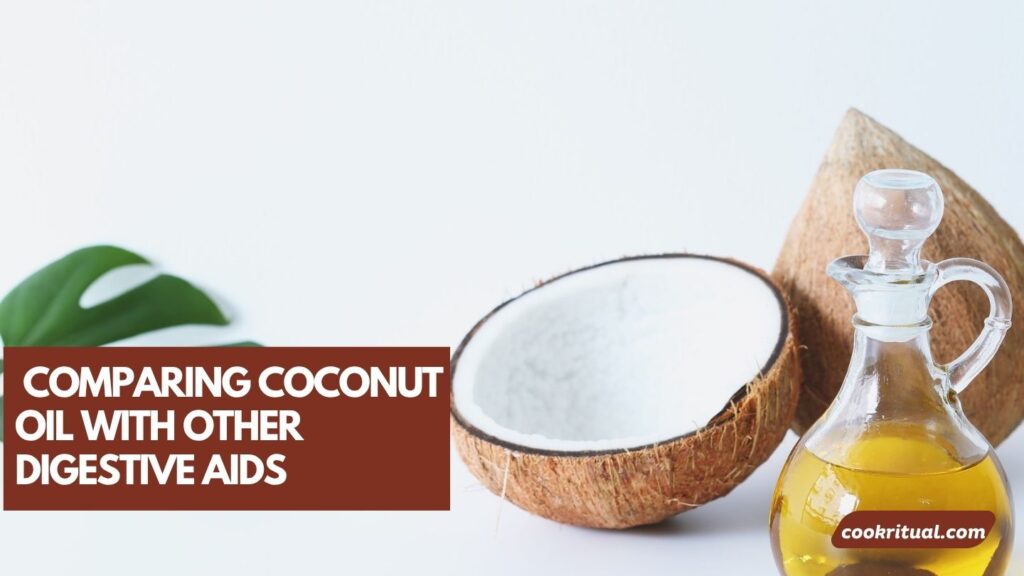Coconut oil can be a natural game-changer for anyone seeking better digestion and improved gut health. It’s not just a trendy ingredient in the health world—it’s a time-tested remedy packed with benefits for our digestive system. Many of us struggle with occasional bloating, sluggish digestion, or discomfort after meals, and the solution might just be sitting in our kitchen cabinets.
We often look for quick fixes or supplements, but embracing natural solutions like coconut oil can provide lasting relief and benefits. Its unique composition of medium-chain fatty acids (MCFAs), especially lauric acid, supports nutrient absorption and balances gut flora. Plus, it’s versatile and easy to incorporate into daily meals. Imagine enhancing your smoothies, salad dressings, or even morning coffee with a simple spoonful of coconut oil—all while promoting a healthier gut.
In this guide, we’ll dive into exactly how coconut oil works to aid digestion, how to use it safely, and how it compares with other natural remedies. By the end, you’ll be equipped with practical, kitchen-tested strategies to harness its full potential for your gut health.
Contents
- 1 Understanding Coconut Oil and Its Digestive Benefits
- 2 Practical Ways to Incorporate Coconut Oil into Your Diet
- 3 Pros and Cons of Using Coconut Oil for Digestion
- 4 Comparing Coconut Oil with Other Digestive Aids
- 5 Selecting the Right Coconut Oil for Digestive Health
- 6 Frequently Asked Questions (FAQs)
- 7 Conclusion
Understanding Coconut Oil and Its Digestive Benefits

1.1 What Is Coconut Oil?
Coconut oil comes from the white flesh of coconuts. We can choose between virgin and refined coconut oil. Virgin coconut oil is made from fresh coconuts without high heat. It keeps more nutrients and a light coconut smell. Refined coconut oil is made from dried coconut meat and is more processed. It has a neutral taste and higher smoke point.
Coconut oil is rich in medium-chain fatty acids (MCFAs) like lauric acid. These fatty acids are easier for the body to break down and use for energy than long-chain fats. Lauric acid also has antibacterial and anti-inflammatory properties.
For more on the composition of coconut oil, visit Harvard T.H. Chan School of Public Health.
1.2 How Coconut Oil Aids Digestion
Coconut oil helps our bodies in three key ways:
- It improves the absorption of fat-soluble vitamins like A, D, E, and K.
- Its antimicrobial action helps balance the gut microbiota, which supports digestion and overall health.
- It can have a mild laxative effect, which helps prevent constipation and promotes regular bowel movements.
Studies have shown that coconut oil can protect the gut from harmful bacteria. You can read more about this from the National Center for Biotechnology Information (NCBI).
Practical Ways to Incorporate Coconut Oil into Your Diet
2.1 Daily Consumption Tips
- Start slow: Begin with 1 teaspoon per day to see how your body reacts.
- Best time: Take coconut oil in the morning or before meals to help with fat digestion.
- Increase gradually: Work up to 1–2 tablespoons per day if it feels right for you.
2.2 Cooking and Preparation Methods
Coconut oil is very versatile. Here are easy ways to add it to your diet:
- Use it to sauté veggies, meat, or tofu.
- Add a spoonful to your morning smoothie or coffee.
- Mix it into salad dressings or homemade sauces.
- Use it in baking recipes as a butter substitute.
Pair coconut oil with probiotic-rich foods like yogurt or kimchi. This combo can help keep gut flora balanced. For more on probiotics, check the Cleveland Clinic’s guide on probiotics.
Pros and Cons of Using Coconut Oil for Digestion
3.1 Advantages
- Natural remedy with minimal side effects.
- Supports gut health and may boost immune function.
- Provides quick energy through MCFAs.
3.2 Potential Drawbacks
- Some people might have allergic reactions or feel stomach upset.
- Too much coconut oil can add extra calories and saturated fat, which may not be good for heart health.
- It’s best to balance coconut oil with other healthy fats like olive oil.
Here’s a simple comparison:
| Feature | Pros | Cons |
| Digestive Support | Balances gut flora, boosts absorption | May cause mild discomfort if overused |
| Nutritional Value | Provides healthy fats and lauric acid | High in saturated fat |
| Ease of Use | Easy to add to meals, versatile | May not suit all dietary needs |
For a balanced view on coconut oil’s health effects, visit Mayo Clinic’s coconut oil article.
Comparing Coconut Oil with Other Digestive Aids

4.1 Coconut Oil vs. Other Natural Oils
Coconut oil has unique benefits compared to oils like olive oil or flaxseed oil. It has more medium-chain fatty acids (MCFAs), which the body uses for quick energy. Other oils, such as olive oil, are rich in monounsaturated fats and omega-3s. While both are good for health, coconut oil may be better for gut support because it helps fight harmful bacteria and supports gut flora.
| Oil Type | Benefits for Digestion | Key Nutrients |
| Coconut Oil | Boosts gut flora, supports nutrient absorption | Lauric acid, MCFAs |
| Olive Oil | Helps reduce inflammation, supports heart health | Oleic acid, polyphenols |
| Flaxseed Oil | High in fiber and omega-3s, helps with constipation | Alpha-linolenic acid, fiber |
For a deeper dive into oil comparisons, visit Harvard Health’s guide on healthy fats.
4.2 Coconut Oil vs. Probiotic Supplements
Probiotics offer live beneficial bacteria that support digestion. Coconut oil works differently. It helps keep harmful bacteria away and supports the natural balance of gut bacteria. For some, taking both probiotics and coconut oil might give even better results.
- Coconut oil works by reducing bad bacteria and improving fat digestion.
- Probiotics work by adding healthy bacteria directly to the gut.
In certain cases, probiotics may be more helpful, such as after antibiotics. Learn more about probiotics from National Center for Complementary and Integrative Health (NCCIH).
Selecting the Right Coconut Oil for Digestive Health
5.1 What to Look for When Buying
Choose virgin, cold-pressed, unrefined coconut oil. This type keeps the most nutrients and has a mild coconut flavor. Look for organic labels and third-party testing to ensure quality.
Key things to check:
- Labels: “Virgin” or “Extra Virgin,” “Unrefined,” and “Cold-Pressed.”
- Certifications: USDA Organic, Non-GMO, or similar.
- Smell: Light coconut aroma (a sign of freshness).
Learn more about buying good-quality oils from USDA’s organic certification guide.
5.2 Storage and Shelf Life
Keep coconut oil in a cool, dark place to keep it fresh. A pantry works well. Once opened, use it within 1–2 years. If it smells bad or has mold, it’s time to toss it.
| Storage Method | Shelf Life |
| Cool pantry, sealed | 1–2 years |
| Refrigerator | Can extend freshness but may harden |
Frequently Asked Questions (FAQs)
- Can coconut oil cause digestive discomfort?
Yes, some people may feel mild stomach upset when starting. Start slow and increase over time. - Is coconut oil safe for people with gallbladder issues?
If you have gallbladder problems, check with a doctor first. Some fats can make symptoms worse. - How long does it take to see digestive benefits?
It may take a few days to a couple of weeks, depending on your body. - Can kids and pregnant women use coconut oil for digestion?
Generally safe in small amounts, but check with a healthcare provider first.
For more guidance on safe use, visit Mayo Clinic’s nutrition advice.
Conclusion
Coconut oil can be a simple and natural way to boost digestion and support gut health. It’s rich in MCFAs and lauric acid, which help balance gut bacteria and improve nutrient absorption. By starting with small amounts, adding it to meals, and choosing the right type, we can enjoy its full benefits.


